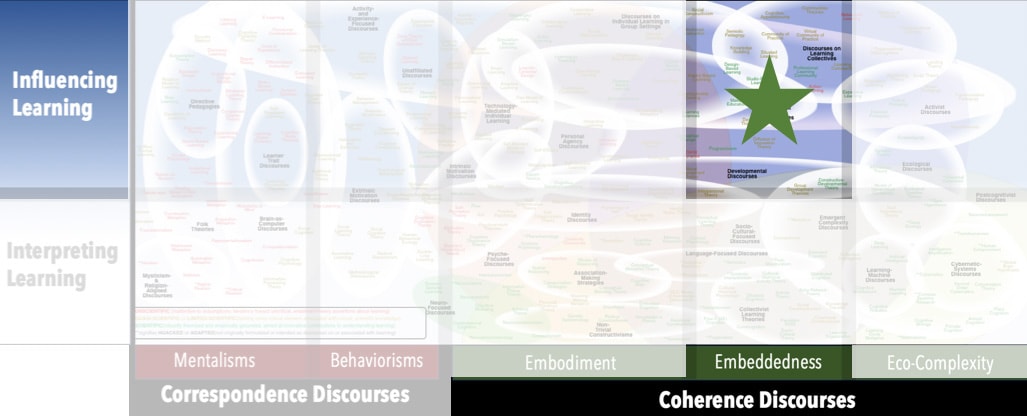Focus
Social, political, and cultural conditions that contribute to power imbalancesPrincipal Metaphors
- Knowledge is … scope of interpretations and actions
- Knowing is … critical consciousness
- Learner is … a change agent (individual and/or collective)
- Learning is … interrogating (the conditions of one’s existence) and participating (in efforts to enact meaningful change)
- Teaching is … learning alongside (i.e., interrogating and co-participating)
Originated
1970sSynopsis
Feminist Pedagogy is a Critical Pedagogy that shares its activist goals around raising consciousness and decentering power, but that generally places more emphasis on interrogating the notion of “essential identity,” analyzing gender norms, respecting difference, fostering teacher–student relationships, formatting content in personally meaningful ways, and seeking resonances across individual and mutual goals. Feminist Pedagogy is aligned with other forms of Critical Pedagogy, including those focused on race, class, ethnicity, post-colonialism, and sexuality. Importantly, Feminist Pedagogy is informed by multiple feminist movements and theories, including:- Radical Feminism – Grounded on the tenet that the oppression of women is the most fundamental form of oppression, Radical Feminism is focused on social change – this is of major proportions, and that is often associated with jarring tactics.
- Liberal Feminism – Oriented by the principle of equity, Liberal Feminism is a rights-focused movement that’s aimed at the integration of women into all aspects of mainstream society.
- Socialist Feminism (Marxist Feminism) – Perhaps the most prominently represented feminism in Feminist Pedagogy, Socialist Feminism draws on Marxist philosophy at it attributes the oppression of women (and others) to capitalist impulses.
- Cultural Feminism (Relational Feminism)– Similarly oriented as Radical Feminism in the tenet that the oppression of women is the most fundamental form of oppression, Cultural Feminism is a more recent movement that is expressed in efforts to build a women’s culture – which encompasses such broadly varied activities as building rape crisis centers, supporting female political candidates, and nurturing a women’s arts scene.
- Eco-Feminism – Grounded in the tenet that patriarchy cannot be dissociated from capitalism – and, consequently, will mindlessly exploit the planet’s resources to the point of self-destruction – Eco-Feminism cites parallels to the treatment of women and the treatment of the more-than-human world.
- I-Feminism (Individualist Feminism) – Emphasizing the choice, freedom, respect, and personal responsibility, I-Feminism seeks legal equality for all.
Commentary
Criticisms of Feminist Pedagogy are typically similar to those of Critical Pedagogy. In fact, with regard to similarities, perhaps the most commonly voiced concern is that Feminist Pedagogy is not especially distinct from other forms of Critical Pedagogy.Authors and/or Prominent Influences
Patti Lather; Madeleine Grumet; bell hooksStatus as a Theory of Learning
Feminist Pedagogy is not a theory of learning, as it does not address the complex dynamics of learning.Status as a Theory of Teaching
Feminist Pedagogy is a theory of teaching that is oriented toward recognizing and taking constructive action against unhealthy power dynamics and other injustices. Teachers are encouraged to learn alongside their students, collectively engaged in critical discussions of entrenched habits of thinking and possible strategies of action.Status as a Scientific Theory
Feminist Pedagogy does not meet the requirements of a scientific theory. However, it is informed by well-known and empirically grounded Embodiment Discourses and Embeddedness Discourses – including, most prominently, Socio-Cultural Theory.Subdiscourses:
- Cultural Feminism (Relational Feminism)
- Eco-Feminism
- I-Feminism (Individualist Feminism)
- Liberal Feminism
- Radical Feminism
- Socialist Feminism (Marxist Feminism)
Map Location

Please cite this article as:
Davis, B., & Francis, K. (2023). “Feminist Pedagogy” in Discourses on Learning in Education. https://learningdiscourses.com.
⇦ Back to Map
⇦ Back to List
